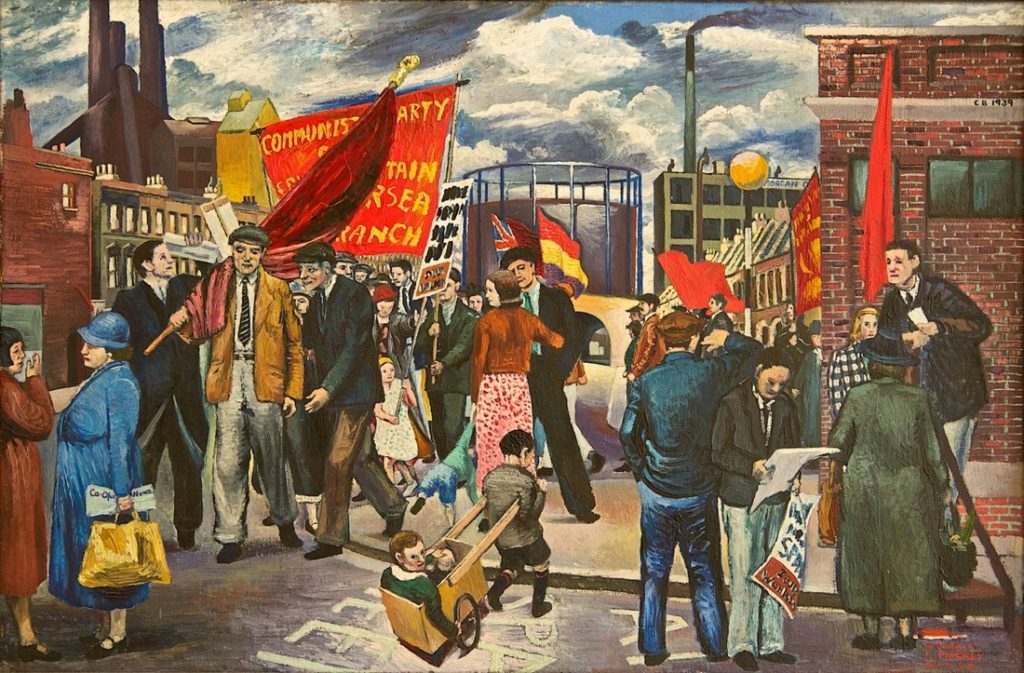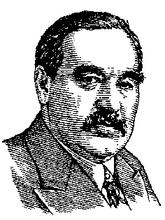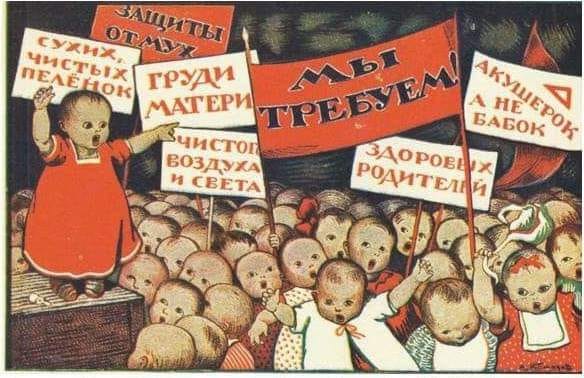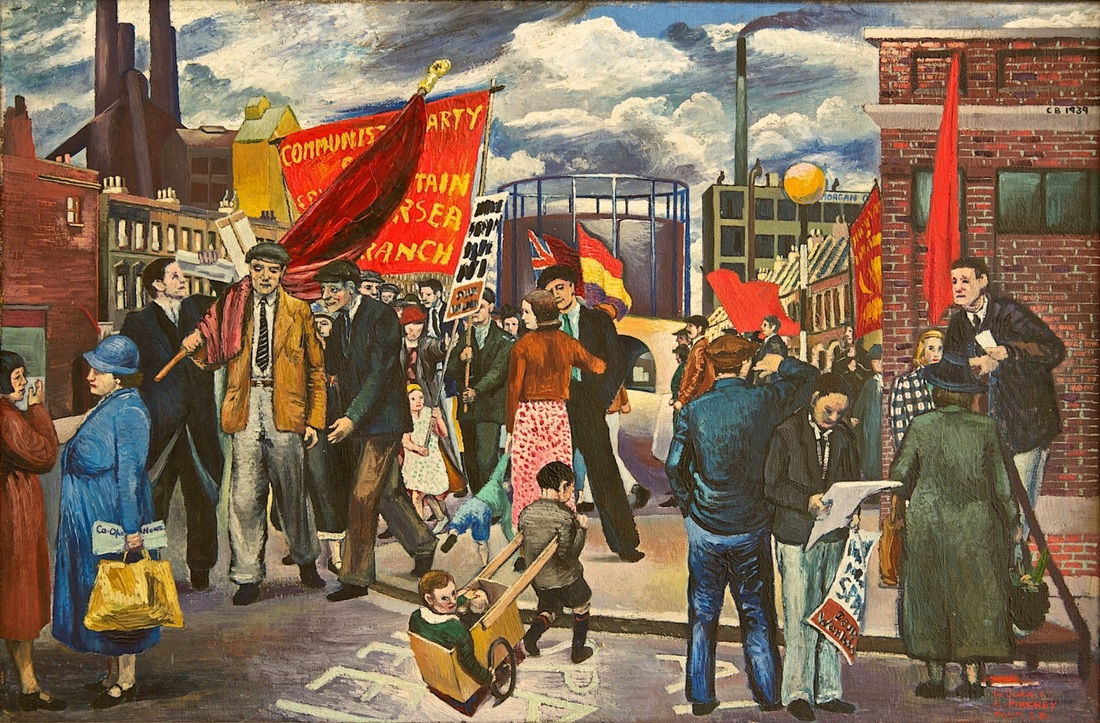Chris Koch argues that the current ailments of the modern left are a product of its class composition. To escape this predicament we must master the art of agitation.

Last year, in the face of a crisis that is all too common among revolutionary organizations, the International Socialist Organization (ISO) dissolved. We are faced with a grim reality. Revolutionary socialist organizations have a long history of sexual assault, unwelcoming practices to oppressed minorities, significant sectarianism, voluntarism, and substitutionism. And while reformist groups like the Democratic Socialists of America have currently grown to more than 50,000 members, revolutionary socialist organizations have remained stagnant. We must strive to understand why this is.
What is wrong with our organizations? Numerous ideas have been put forward. Some argue that revolutionary socialist organizations are micro-sects that act as though they are vanguard parties. Others argue that they are propaganda circles with no need for democratic forms of organization. Different organizations have different organizing models, yet common problems persist. What we need to look for is a common cause. So, we must move up a level of abstraction. An organization does not exist independent of its membership. What we need to understand is the class character of the membership and, from this, the organization. Once we have answered this question we can determine what sort of party is needed.
When we look at revolutionary socialist organizations, we find that they tend to be comprised of petit-bourgeois, intelligentsia, students, and other middle-class elements (henceforth oversimplified to petit-bourgeois). As a result, our organizations tend to be whiter and more male than the working class. And because of this class composition, our organizations are tainted with petit-bourgeois ideology.
As Karl Marx put it in The German Ideology, “It is not the consciousness of men that determines their being, but, on the contrary, their social being that determines their consciousness.” Those whose social being is petit-bourgeois can have a corrupting influence on our organizations if they are not curbed by self-imposed vigilance or outside influences. As it stands, it is not surprising that shop-owners, professors, students, professionals, and middle managers import a cult of leadership and a semi-mystical view of knowledge. Our leadership is seen as indispensable, our party’s program and theory are seen as the secret key.
That leadership is seen as indispensable by Leninist groups is obvious. Members and former members of the ISO have pointed to the systematic abuse of members by the former leadership in the pages of Socialist Worker, while documents leaked by SCC Insight indicate that the same issues pervade Socialist Alternative. And yet, the leadership stays in power for long periods of time. Organizations spend their time training the future leaders of the as yet non-existent vanguard party, substituting this work for the class struggle. Training leaders is seen as more important than persuading the vanguard of the working class of the truths of revolutionary socialism. But what more can be expected of the class of small business-owners, managers, and professionals?
Moreover, petit-bourgeois thought, especially spread among students and the intelligentsia, is given to a semi-mystical approach to knowledge. It is they who are the keepers of the truths of revolutionary socialism, and those who disagree are to be beaten into submission. Nevermind that the most successful of previous organizations were not so wedded to their programs that they could not change or deal with dissent. The First International tried to weld Marxists, anarchists, and Chartists together. Lenin and Bukharin were able to have a sustained debate on the national question and never came to an agreement. Splits happened when serious and irreconcilable differences arose. The splits that created most of the modern Trotskyist organizations were as small as seeing the Soviet Union as a degenerated workers’ state or as bureaucratic collectivist or as state capitalist. And membership in most current organizations requires accepting a large number of fine points that are certainly debatable by sincere and knowledgeable revolutionary socialists.
Organizations are treated as if they hold sacred knowledge, whose role it is to train leaders to fight a future revolution or, at best, to convince workers of a very particular program. Their leaders are to be respected as the holders of the most esoteric, mystical knowledge who can guide the organization forward. All other programs are to be reviled and any potential member is to be indoctrinated into a vast web of precise knowledge. Individual theoretical work and education substitute for the class struggle. From this springs ineffective, undemocratic practices. When workers or oppressed peoples have a perspective that differs from the organization, they are ostracized. Their experiences are ignored. Agitation often takes the form of condescending education about the arcane particulars of theory. Is it any surprise that workers and other oppressed peoples do not feel welcome in our organizations?
Even our descriptions of the greatest triumph of the working class betray this petit-bourgeois corruption. The tale of the Russian Revolution is not told as the history of working-class triumph or as the struggle of revolutionary socialist organizations or even as the struggle of the Bolsheviks as a whole. Rather, it is told as the tale of great men of history. There was a spontaneous uprising in February, followed by chaos, followed by Lenin heroically rearming the party in April, followed by a setback from a premature action in July that Lenin wisely saw as premature, followed by Lenin and Trotsky brilliantly forming a united front with Kerensky against Kornilov, followed by Lenin and Trotsky (with the backing of the workers) leading an uprising, followed by Trotsky winning the Civil War singlehanded. It is disheartening to recall that the two works that best document working-class self-activity during the Russian Revolution—The Bolsheviks Come to Power and Red Petrograd—were not written by revolutionary socialists, but by liberal bourgeois historians. Where are our books telling the tale from the perspective of the people who actually changed history? Where is our emphasis on the role the working class played? All we have are petit-bourgeois romances of Lenin and Trotsky leading the workers as Napoleon led his armies.
This is not to diminish the importance of either effective leadership or theory. Rather, it is a cry for proper proportions. Leadership is needed; theory is essential. Lenin and Trotsky were important to the success of the Russian Revolution. But we must stand against distortion and emphasize the workers who went on strike, formed the soviets and factory committees, who turned the Bolsheviks into a mass party, pushed for a transfer of power to the soviets, and who fought and died for the possibility of a socialist future.
We see that our parties are corrupted by petit-bourgeois ideology leading to substitutionism and sectarianism. Now that we have a diagnosis, we must look for a cure. The most obvious solution would be to increase the number of workers in the organizations, thereby changing the class character of the organizations themselves. As more workers take leadership positions and the petit-bourgeois elements are relegated to the sidelines, our organizations will take on a different, more suitable form. And while I cannot prove this, it is probable that the ISO’s reorientation away from campus organizing, and towards workplace organizing and working-class radicalism, was the cause of the ISO’s shift from slate voting and the subsequent uprooting of the entrenched leadership. We need a wave of workers to wash out the muck.
The problem with the cure is the disease itself: our organizations are too petit-bourgeois to be welcoming to workers. Moreover, it is difficult for the petite bourgeoisie to persuade workers that an organization dominated by petit-bourgeois elements is the surest path to self-emancipation. I recall from my early and short-lived days in Seattle, a machinist during the Boeing machinist strike of 2008 who played a key role in organizing and leading the strike. He had a long-standing working relationship with revolutionary socialists. At no point did this man, a Ron Paul supporter whose influence among other machinists was incredible, want to join any revolutionary socialist organization. We need influential workers like him, but at no point could he be persuaded to join. Why should he listen to us? It’s not as though we were machinists or worked at Boeing.
This is not a new problem. Consider the experiences of the Russian Social Democratic Labor Party (RSDLP), of which the Bolsheviks were a faction. In his Lenin and the Revolutionary Party, Paul Le Blanc points out that even socialist workers often did not join the RSDLP until 1905, since, “workers harbored suspicions and resentments toward revolutionary students and intellectuals, whose class origins were so different from theirs.” The students and intellectuals had issues relating to workers, often behaving in patronizing and condescending ways. It was easy for workers to assume that revolution was a game for these petit-bourgeois socialists who had security derived from their status or parents and who were susceptible to changing their position as life became more comfortable.
It was the Russian Revolution of 1905 that saved the RSDLP from irrelevance. Yet even prior to that, they had far greater success in recruiting influential workers, like the Boeing machinist, than our organizations have ever dreamed of. Consider the case of the worker-Bolshevik Alexander Shlyapnikov.

Shlyapnikov joined the RSDLP in 1901 at the age of sixteen, already a skilled metalworker and strike leader. His exposure to revolutionary literature in 1899 was swiftly followed by a series of strike actions in which he witnessed brutal state repression and, for his own participation, was blacklisted. His rising class consciousness came through exposure to revolutionary ideas through agitators and direct experience in the class struggle. He was a key figure among the Bolsheviks, more easily persuading other workers to join and curbing Lenin’s more petit-bourgeois attitudes. However, Shlyapnikov received his revolutionary materials from other workers, those who were in the same situation as him. We are still stuck in a paradox. To get workers to join we need workers in our ranks who can relate to other workers. To get out of this problem we must look past the cure and begin to take palliative measures.
Our organizations are too leadership-oriented, too focused on the minutiae of theory, too undemocratic to be welcoming to workers and other oppressed peoples. So, we must make every effort to change democratic centralism to democratic centralism. Slate voting cannot be allowed. Branches need to be able to operate independently. Free and open discussion needs to be emphasized. “Freedom of discussion, unity of action” must be modified with branch-level freedom of interpretation. Theory and discussion should be encouraged, but unity of thought should be resisted. Any attempts to force a particular theoretical perspective on any member must be condemned by the membership as a whole. Membership requirements should not be based on too many particular points but on a broad agreement with the principles of revolutionary socialism, especially the self-emancipation of the working class. All of this is to be done in the name of making our organizations open to workers and oppressed peoples. These are broad generalizations and must be, as I cannot speak to every particular circumstance. It is up to the membership of the various branches of the various organizations to democratically discuss and apply these broad measures. It will be difficult and there will be missteps, but it is important for us to survive the pain until we can receive the cure.
A more specific measure can be directed towards the orientation of our organizations. Rather than placing our emphasis on training new leaders, we must place greater emphasis on agitation. As Lenin put it in Left-Wing Communism: An Infantile Disorder:
While the first historical objective (that of winning over the class-conscious vanguard of the proletariat to the side of Soviet power and the dictatorship of the working class) could not have been reached without a complete ideological and political victory over opportunism and social-chauvinism, the second and immediate objective, which consists in being able to lead the masses to a new position ensuring the victory of the vanguard in the revolution, cannot be reached without the liquidation of Left doctrinairism, and without a full elimination of its errors.
As long as it was (and inasmuch as it still is) a question of winning the proletariat’s vanguard over to the side of communism, priority went and still goes to propaganda work… the mere repetition of the truths of “pure” communism…
Lenin saves the development of leaders and leadership to the second historical task of revolutionary socialists. It is within the vanguard of workers that leaders will be found, not the petit-bourgeois members who first form the organization. And it is the vanguard of the workers organized together who will lead the masses in the class struggle. They will create a mass party through the common struggle of people who have a shared stake in the outcome. The emphasis prior to this is not one of leadership or building organizations, but of agitation.
Our organizations must become agitational organizations. After the bosses’ offensive and neoliberalism all but eliminated the vanguard of the working class, workers are beginning to radicalize again on many different lines. From Occupy Wall Street to Black Lives Matter, from No One is Illegal to Standing Rock, from the Women’s March to the Occupation of the Airports, from the Teachers’ Strike Wave to the air traffic controllers ending the government shutdown, workers and oppressed peoples are radicalizing. A vanguard is forming; we need trained agitators.
Agitators, while similar, differ from leaders and educators. The agitator differs from the leader not in organizational abilities, but in focus. A good agitator can help organize a rally or a strike but focuses on spreading the message in a persuasive manner. The agitator differs from the educator not in knowledge, but in method. A good agitator knows the theory but does not condescend to workers about what they already know. Rather, the agitator persuades them that it is in their best interests to unite with other workers in a revolutionary socialist organization. That is to say, an agitator must be trained in the art of persuasion, and in that we have been lacking.
There are a couple of exceptions to this general lack of effective agitation. As far as selling newspapers goes, revolutionary socialists have maintained a high standard. This has allowed us to make some meaningful connections with people who at least somewhat agree with our positions. We have also done a great job at engaging in agitation by the deed. That is, we have engaged in various struggles and demonstrated both effectiveness and a willingness to fight for a better future. These are both excellent forms of agitation and should continue, but they are limited. They do not agitate as far and wide as is needed.
Encouragingly, revolutionary socialists are producing podcasts that have the potential to reach workers and oppressed peoples across the world. Even though these podcasts require workers to already be inclined towards socialism, we need to help distribute work like this to maximize their reach. And yet, despite the fact that these podcasts have the potential to reach millions of workers, we cannot make that potential actual until the underlying problem is addressed.
We face a crisis of ethos. By this I mean we lack credibility, one of the key elements of persuasion. This is a consequence of the class character of our organizations. Why should a worker listen to one of the petite bourgeoisie? If our organizations are to swell with workers, we must develop credibility.

Our most common and important interactions with workers are on an interpersonal basis. We need to make sure that we are not acting as condescending educators or obnoxious harangers, but as persuasive agitators. Consider Trotsky, who was a successful agitator despite his petit-bourgeois background. In his letters, he pointed out the importance of listening to workers and oppressed peoples. We must learn to listen with care to gain credibility and build better relationships. Nothing is more important than this. Every agitator must know how to be an active listener. That is to say, agitators must be able to fully concentrate, maintain eye contact, react with genuine, appropriate sympathy, ask relevant questions, and build off of what is said. By doing this we can validate their experiences, draw revolutionary conclusions, and demonstrate the truth that we are subordinate to them, not the other way around.
Furthermore, we are often confronted with public speaking opportunities. At the end of a successful rally or in the midst of a strike or standing on a street corner we can be called on to speak (we are already willing to hawk newspapers on the streets like it’s the 1930s, we might as well try standing on ladders and bellowing out speeches). And what happens? Whatever ethos has been garnered through agitation by the deed dissipates during dispassionate speeches, read instead of delivered, that focus purely on appeals to reason. While we must always strive to have appropriate appeals to reason when we speak, so that our deductions are valid, our analogies are strong, and our inductions are probable if not certain, credibility is not garnered by reason alone. It is to education that pure reason belongs, and it is a petit-bourgeois mistake to think that we are educators. Education happens when a person joins or is thinking about joining the organization, but first they must be persuaded. And persuasion is the domain of the agitator.
To persuade, it is necessary to appeal to the emotions of the audience. To gain credibility, we must show that we understand the emotional stakes. We do this on occasion, but nowhere near often enough. We must try to arouse indignation against the bosses, the cops, and the capitalist system itself. We must try to arouse pity for and solidarity with other workers regardless of nationality, race, sex, or any other division that capitalism foists upon them. Such emotional appeals are necessary for oratory and for drawing revolutionary conclusions during discussions with workers. But this is not all.
Great oratory requires great delivery. We must move away from the calm and dull Noam Chomsky approach that prefers to bore, since that shows the seriousness of the listener. Rather, we must follow the likes of Martin Luther King, Malcolm X, Mother Jones, Eugene Debs, Leon Trotsky, Big Bill Haywood, and Elizabeth Gurley Flynn, who wore their emotions on their sleeves as they spoke. When fighting against exploitation and oppression, great passion is required. Our credibility grows if we can show our sincere commitment to the cause of workers and oppressed minorities. We must speak with fire and passion if we are to convince a large number of workers to join our organizations.
Moreover, our writing is often stilted and not fun to read. We are living in an era where the written word can be easily spread far and wide. Any one of us can start a blog to try to spread the truths of revolutionary socialism. Any one of us can make a professional-looking pamphlet to distribute, either through social media or in person, and reach more workers than could have been imagined mere decades ago. Imagine if the Communist Manifesto were written in the same academic, dull style that most revolutionary publications favor. Who would it have inspired? Who would read it today? Strong writing is still a necessary part of agitation, and one that we must start to do again.
This may all seem superficial. But the reality is that our problem is a superficial problem and its solution is a superficial one. The sad fact is that we should have been doing this from the beginning. The process will be slow. At first, we can expect a trickle, a few workers who are able to hear and reflect on the truths we express. Then, those workers, with their far greater ethos, can persuade the Alexander Shylpnikovs of the workplace to join, causing a wave that washes out the muck in the party. And as more and more radicalizing situations open more workers to the truths of revolutionary socialism, a flood of workers will turn our then-vanguard parties into mass parties, which will drown the capitalist system.


50 Replies to “The Need for Agitational Organizations”
Comments are closed.